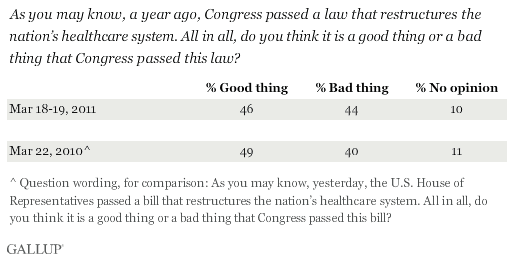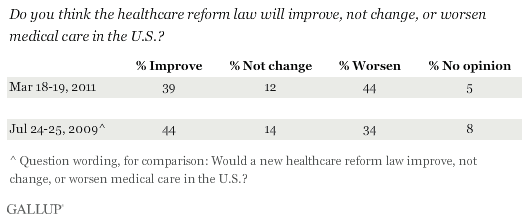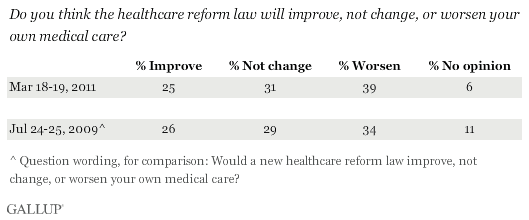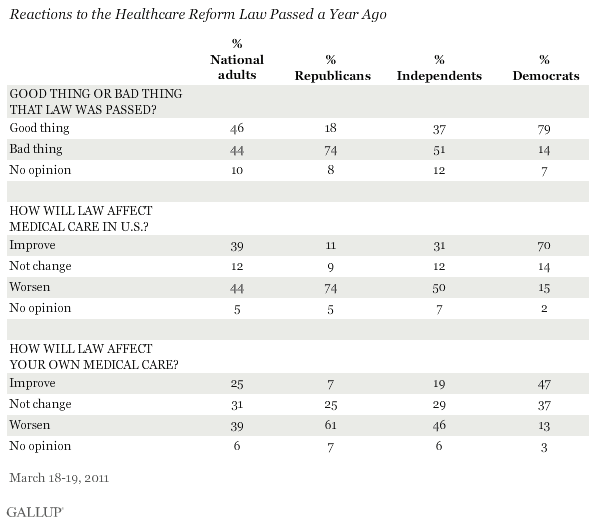PRINCETON, NJ -- One year after President Obama signed the Patient Protection and Affordable Care Act into law, Americans are divided on its passage, with 46% saying it was a good thing and 44% saying it was a bad thing. Most Americans are skeptical that the law will improve medical care in the U.S. or their own personal medical care.

The current level of support for the bill, based on a Gallup poll conducted March 18-19, generally mirrors what Gallup found in polling conducted a year ago, just before President Obama signed the bill into law. At that point, in response to a slightly different question, 49% said the law was a good thing, while 40% said it was a bad thing. Other updates asked over the last year show a similar divide.
More Americans See the Law Making Things "Worse" Rather Than "Better"
Well less than half of Americans believe the law will make medical care better either for the United States as a whole, or for them personally. In both regards, more believe the law will make things worse rather than better.
Opinions on the impact of the healthcare law on medical care in the U.S. are divided in similar fashion to Americans' overall reactions to the bill: 39% say it will improve medical care in the United States, while 44% say it will make it worse. Small percentages say the law won't change anything or offer no opinion. These responses are roughly similar to attitudes seen in July 2009, as the outlines of the law were just coming into place.

Americans are less positive about the impact of the healthcare reform law on their own medical care. Twenty-five percent say the law will improve their medical care, 39% say it will worsen it, and 31% say it will not make any difference. These results are also similar to those found in July 2009.

Politics Shapes Views of Healthcare Law
Democrats and Republicans have totally different views of the healthcare law, as has consistently been the case since Gallup began measuring attitudes toward it. The law was proposed by a Democratic president, and passed by a Democratic-controlled House and Senate over the vehement objections of most Republicans in Congress. Republicans have also continued to criticize the bill since its passage, and Republican leaders in Congress are now pursuing efforts to prevent many of the bill's provisions from taking effect.
Almost 8 in 10 Democrats say the law's passage was a good thing, while more than 7 in 10 Republicans say its passage was a bad thing. Independents tilt toward saying passage was a bad thing. Reactions to the impact of the law on medical care in the U.S. are similarly divided.

Democrats are a little more muted in their views of the law's impact on their own medical care, with about half saying it will improve their medical care, while most of the rest say it will not change it. About 6 in 10 Republicans say the law will worsen their medical care, while nearly half of independents agree.
Implications
The American public's reactions to the landmark healthcare law passed a year ago continue to echo the bitter partisan nature of congressional debate in 2009 and 2010.
Democrats applaud the law and say it will improve medical care in the U.S., while Republicans strongly believe that its passage was a bad thing and that it will make medical care worse. Independents tend to be more negative than positive about the law.
These reactions reflect a lot of politics and perhaps less reality, given that a full assessment of the real-world effects of the law is not possible at this time, because many of its provisions have not yet taken effect. Still, in politics, perception often becomes reality. And in that regard, President Obama and Democratic leaders who supported the bill currently face a public that is less than overwhelmingly positive about the bill and its promised ability to fix healthcare problems in the U.S.
Survey Methods
Results for this Gallup poll are based on telephone interviews conducted March 18-19, 2011, on the Gallup Daily tracking survey, with a random sample of 1,038 adults, aged 18 and older, living in all 50 U.S. states and the District of Columbia, selected using random-digit-dial sampling.
For results based on the total sample of national adults, one can say with 95% confidence that the maximum margin of sampling error is ±4 percentage points.
Interviews are conducted with respondents on landline telephones and cellular phones, with interviews conducted in Spanish for respondents who are primarily Spanish-speaking. Each daily sample includes a minimum quota of 200 cell phone respondents and 800 landline respondents, with additional minimum quotas among landline respondents for gender within region. Landline respondents are chosen at random within each household on the basis of which member had the most recent birthday.
Samples are weighted by gender, age, race, Hispanic ethnicity, education, region, adults in the household, cell phone-only status, cell phone-mostly status, and phone lines. Demographic weighting targets are based on the March 2010 Current Population Survey figures for the aged 18 and older non-institutionalized population living in U.S. telephone households. All reported margins of sampling error include the computed design effects for weighting and sample design.
In addition to sampling error, question wording and practical difficulties in conducting surveys can introduce error or bias into the findings of public opinion polls.
View methodology, full question results, and trend data.
For more details on Gallup's polling methodology, visit www.gallup.com.
